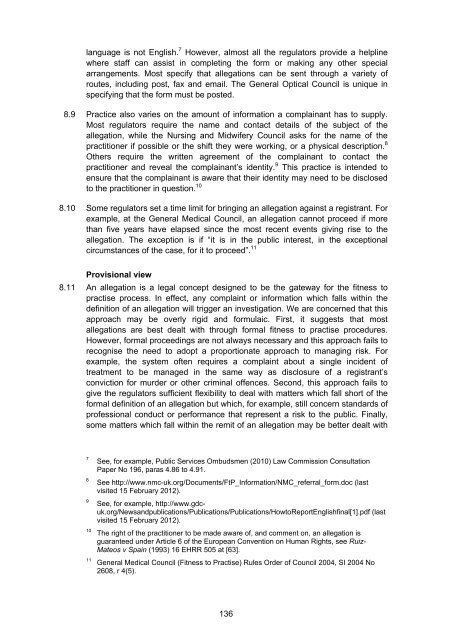Regulation of Health and Social Care Professionals Consultation
Regulation of Health and Social Care Professionals Consultation
Regulation of Health and Social Care Professionals Consultation
Create successful ePaper yourself
Turn your PDF publications into a flip-book with our unique Google optimized e-Paper software.
language is not English. 7 However, almost all the regulators provide a helpline<br />
where staff can assist in completing the form or making any other special<br />
arrangements. Most specify that allegations can be sent through a variety <strong>of</strong><br />
routes, including post, fax <strong>and</strong> email. The General Optical Council is unique in<br />
specifying that the form must be posted.<br />
8.9 Practice also varies on the amount <strong>of</strong> information a complainant has to supply.<br />
Most regulators require the name <strong>and</strong> contact details <strong>of</strong> the subject <strong>of</strong> the<br />
allegation, while the Nursing <strong>and</strong> Midwifery Council asks for the name <strong>of</strong> the<br />
practitioner if possible or the shift they were working, or a physical description. 8<br />
Others require the written agreement <strong>of</strong> the complainant to contact the<br />
practitioner <strong>and</strong> reveal the complainant’s identity. 9 This practice is intended to<br />
ensure that the complainant is aware that their identity may need to be disclosed<br />
to the practitioner in question. 10<br />
8.10 Some regulators set a time limit for bringing an allegation against a registrant. For<br />
example, at the General Medical Council, an allegation cannot proceed if more<br />
than five years have elapsed since the most recent events giving rise to the<br />
allegation. The exception is if “it is in the public interest, in the exceptional<br />
circumstances <strong>of</strong> the case, for it to proceed”. 11<br />
Provisional view<br />
8.11 An allegation is a legal concept designed to be the gateway for the fitness to<br />
practise process. In effect, any complaint or information which falls within the<br />
definition <strong>of</strong> an allegation will trigger an investigation. We are concerned that this<br />
approach may be overly rigid <strong>and</strong> formulaic. First, it suggests that most<br />
allegations are best dealt with through formal fitness to practise procedures.<br />
However, formal proceedings are not always necessary <strong>and</strong> this approach fails to<br />
recognise the need to adopt a proportionate approach to managing risk. For<br />
example, the system <strong>of</strong>ten requires a complaint about a single incident <strong>of</strong><br />
treatment to be managed in the same way as disclosure <strong>of</strong> a registrant’s<br />
conviction for murder or other criminal <strong>of</strong>fences. Second, this approach fails to<br />
give the regulators sufficient flexibility to deal with matters which fall short <strong>of</strong> the<br />
formal definition <strong>of</strong> an allegation but which, for example, still concern st<strong>and</strong>ards <strong>of</strong><br />
pr<strong>of</strong>essional conduct or performance that represent a risk to the public. Finally,<br />
some matters which fall within the remit <strong>of</strong> an allegation may be better dealt with<br />
7<br />
See, for example, Public Services Ombudsmen (2010) Law Commission <strong>Consultation</strong><br />
Paper No 196, paras 4.86 to 4.91.<br />
8<br />
See http://www.nmc-uk.org/Documents/FtP_Information/NMC_referral_form.doc (last<br />
visited 15 February 2012).<br />
9 See, for example, http://www.gdcuk.org/News<strong>and</strong>publications/Publications/Publications/HowtoReportEnglishfinal[1].pdf<br />
(last<br />
visited 15 February 2012).<br />
10 The right <strong>of</strong> the practitioner to be made aware <strong>of</strong>, <strong>and</strong> comment on, an allegation is<br />
guaranteed under Article 6 <strong>of</strong> the European Convention on Human Rights, see Ruiz-<br />
Mateos v Spain (1993) 16 EHRR 505 at [63].<br />
11<br />
General Medical Council (Fitness to Practise) Rules Order <strong>of</strong> Council 2004, SI 2004 No<br />
2608, r 4(5).<br />
136
















